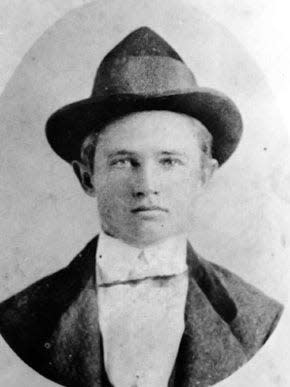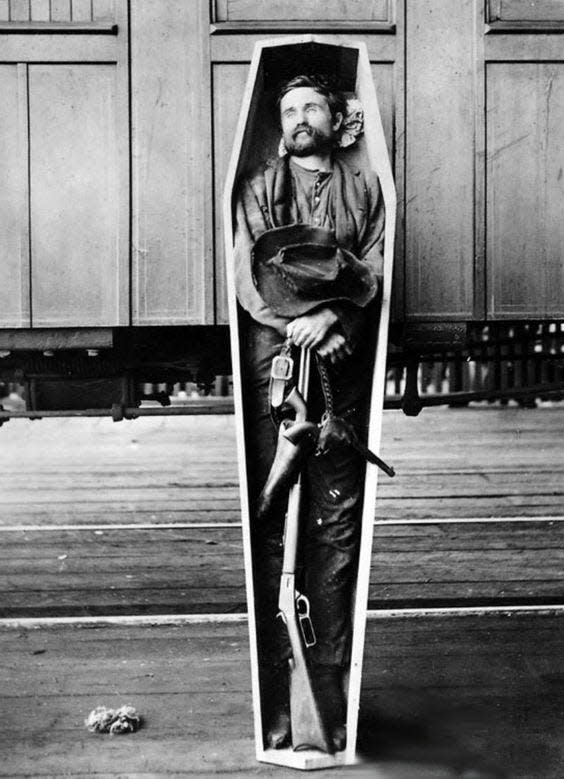Bellevue bandit's story almost lost to history
The quiet hamlet of Bellevue, Texas, today is known mostly as a slow-speed zone on the highway between Wichita Falls and the DFW Metroplex, but for one brief moment very long ago Bellevue marked the start of an infamous career.

The Wichita Falls area has long been associated with the James Gang, the band of bandits led by brothers Jesse and Frank after the Civil War. Frank ran a livery stable in downtown Wichita Falls for a short time and sister Susan James Parmer resided in the city until her death. Susan, her husband Allen Parmer, and several of their children are buried in Riverside Cemetery. It’s possible Jesse James hung around town incognito.
More:From Dallas to Wichita Falls, see how Bonnie and Clyde's connection to TX remains strong
But another outlaw with arguably more kills to his credit began his career in North Texas.
Reuben Burrow became an accomplished train robber and murderer who got his start at Bellevue in Clay County.
“Rube” Burrow seemed destined to live the quiet life of a farmer in his native Alabama. Things changed when his wife died in 1881, leaving him with two children to care for. He tried his luck at farming near Stephenville, Texas, but when the crops failed, he turned to a life of crime.
More:The Santa Claus Bank Robbery: How Christmas went terribly wrong for some Wichita Falls bandits
The beginning of a (short) life of crime
On Dec. 11, 1886, Burrow, his brother Bill and four other men hung out at the Bellevue depot until the Denver & Fort Worth Express from Indian Territory arrived. Then they drew their six-shooters and boarded the train. Their first attempt at banditry wasn’t very impressive. The Fort Worth Daily Gazette reported they got away with only $100 and a handful of pocket watches. Most of the passengers had time to hide their valuables as the robbers made their way down the aisle.
More:Nonprofit blames COVID-19, lack of leadership, for railroad museum shuttering
Second time's the charm
Burrow learned from the experience, though. Six months later his gang held up the Texas and Pacific Express just outside Benbrook near Fort Worth. This time Burrow forced the engineer to stop the train on a trestle where the bandits could search the passengers more thoroughly without interference.
The gang got about $1,350, which was enough to convince Burrow to try the same thing again in the same spot a few months later. Second time was charm. The bandidos got away with an estimated $12,000 to $30,000. Flushed with success, Burrow and company robbed a Southern Express train in Genoa, Ark., and hit the jackpot – maybe as much as $40,000. There was one problem, though. Southern Express did business with the famous Pinkerton Detective Agency. From that point on Rube was on the run.

Pinkerton detectives on his trail
Detectives traced a tip to Dublin, southeast of Fort Worth, where they nabbed a gang member who sang like a stool pigeon, providing the name of the ringleader for the first time. By January 1888, the posse had tracked Burrow to his family’s homestead in Lamar Count, Ala. – but he was tipped off and skedaddled.
A couple of weeks later Rube and brother Jim were spotted on a train in southern Alabama. A shootout followed and Jim Burrow was captured. Rube shot his way out, killing one man. He was wounded in a second gunfight that day but got away.
The close brush and loss of his brother – who died in a Texarkana jail from tuberculosis – did not stop Rube from his criminal ways.
Rube's gang expands criminal activity through the South
He and his gang robbed an Illinois Central express train at Duck Hill, Miss., where Rube killed a passenger who tried to interfere. Next he shot and killed an Alabama postmaster in an argument over a package that contained a false beard disguise. With the law and the Pinkertons hot on his trail, Rube continued to rob trains, first near a town with the unlikely name of Buckatunna, Miss., and then in Louisiana.
The final shootout
As the manhunt continued, Burrow killed one Pinkerton man and seriously wounded three others. Some Alabama men captured him in a cabin in December 1890 and took him to the jail in Linden, but Rube Burrow wasn’t quite done. He locked two jailers in a cell and took a third hostage. He encountered a farmer named Jeff Carter in the street. They had an old-fashioned shootout. When the smoke cleared Carter was wounded – but Rube Burrow was dead in the street at age 34.
Rube took a final ride back to his family’s homestead. The train stopped along the way and displayed his corpse to thousands of gawkers who cut chunks of his hair and swiped his buttons and boots. An iconic photograph shows the outlaw erect in his coffin, still holding his guns. The train crew dumped Rube at his father’s feet. His small gravestone at a tiny and remote Alabama cemetery has been chipped away by souvenir seekers over the years.
Brief flicker of infamy for tiny town
Legend has it that Jesse James killed 20 men. While he likely had several notches on his gun, only one death can be historically verified. Rube Burrow killed four men in his four-year crime spree. He was the subject of the largest manhunt of his time and became widely known for his deeds. In a peculiar quirk of fate, Jesse James remains famous while Rube Burrow is largely forgotten.
The trains still rumble through Bellevue, but they no longer stop. The town’s brief flicker of infamy has been lost to time.
More:After many years space again available at Riverside Cemetery
This article originally appeared on Wichita Falls Times Record News: Bellevue bandit Rube Burrow's story almost lost to history
